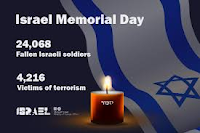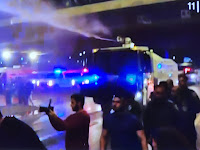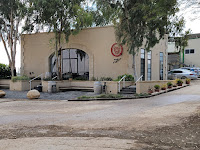Beauty Queen is an Israeli historical fiction series that follows the Ermosa family - a Sephardi Jewish family living in pre-independence Israel. Part one of the series originally aired in Israel in 2021 - as a 44 part series. Each episode was about a half-hour long.
Over the first season, the show moved back and forth between earlier and later decades, which some viewers apparently found too confusing. The series was still a big hit in Israel and Netflix picked it up in late 2021. Netflix divided the first season into two season of 10 episodes each - of just under one hour in length - and of course added subtitles. At first, Netflix only released the first 10 episodes but I believe the "second season" was subsequently released. However, Netflix did not release it all over the world - only in certain countries.
Last year, we watched the first Netflix season, which made up one half of the first Israeli season - about 20-25 of the 44 episodes, which Netflix edited and turned into 10 episodes of about an hour each.
We were determined to see the rest so we found a way to watch the series on YesTV in Israel - but that meant no English subtitles. I guess my Hebrew got a chance to improve somewhat. In order to see everything - we had to start watching at about episode 18 and watched through the original 44.
The series is based on a book by Sarit Yishai-Levi. I have the book but I admit I have not read it yet, though I probably will very soon. The first full season - (the first two Netflix seasons) run from pre-World War I to approximately 1940. The cast is a who's who of Israeli acting including Michael Aloni (one of the main stars of Shtisel), Itzik Cohen (Captain Ayub in Fauda), and a range of other excellent actors including, in particular, Hila Saada (as Rosa), Swell Ariel Or (as the brilliant Luna), Irit Kaplan (as Mercada) and several others.
The series deals with a variety of themes and sub-plots. One constant is the historic backdrop. The series follows the development of the State of Israel before 1948 - while it was under Ottoman and then British control. At first, the Ermosa family, like everyone else in the Ottoman area, is seen managing and dealing with the Turks and Turkish authorities. Following World War I, this transitions to British rule and authority. By the end of Israeli series II (the latest parts), we are at approximately 1943/44 - and still under British control.
A key part of the series is the story of the Ermosa family - and its struggles as a family. Perhaps one might characterize some of this as "soap opera" type content, including infidelity, dysfunctional spousal relationships, love, parenting, the relationship to religion, gender equality issues and limitations in this time period. But we found it extremely compelling. The actors were sincere and believable. The drama was intense though some episodes were particularly violent. Others were emotionally draining. We couldn't stop watching.
This year, YesTV released the next 26 episodes. This will probably all make up about one season on Netflix when it is eventually released of perhaps 10-13 episodes of one hour each or so. For now it is only available in Hebrew so we had to watch it on "Yes On Demand," which we have as part of our cable package.
We finished it this week. It was simply intense, emotional, well-acted and thought provoking. For the newest season, YES changed the format and eliminated the back and forth. It is now mainly chronological and less confusing that way. The new season continues the old season themes but also deals with some very difficult issues - including domestic violence, the relationship between the growing Jewish community in Pre-Israel Palestine and the British (including some harsh looks at the "Lehi" group), Jewish-Arab relations during this time period, religious issues, and other related issues, all against a backdrop of World War II and the horrors taking place in other parts of the world.
I am not going to do a detailed plot analysis here or provide any spoilers but I would say that I think it ranks up at the very top of Israeli productions that I have seen. I will also say (and this is not intended to be a spoiler) that there are some scenes that are extremely violent, that there is a great deal of tension throughout the series. The show is emotionally wrenching and draining. But isn't that what you would want to say about a great production?
Israeli News
I don't intend to provide ongoing details of everything going on in Israel - I would have to become a full time news outlet to do that - and I do have another career....
But here are my few noteworthy items....
The Israeli army fought some of the biggest battles it has fought in recent times today in Jenin. It faced significant resistance from a range of armed Palestinian groups while seeking to arrest some alleged terrorists. Several Israeli soldiers were wounded, some seriously - and a number of Palestinian fighters were killed. This may well be the start of a significant escalation for both sides in the West Bank (Judea and Samaria).
The Israeli Bar Association is holding its elections tomorrow for a new president. This has been making quite a bit of news, partially because of the current political landscape across the country. Some 77,000 lawyers will be voting. The candidate, who is apparently the current front-runner, is Amit Becher, a staunch opponent of the Levin-Rotman proposals to "reform" the judicial system and someone who regularly speaks at protests in Tel-Aviv and across the country. Becher is the current interim leader. His opponent is a former head of the IBA, Efi Naveh. Naveh is a supporter of Levin and Rotman. He is also someone who has been convicted of border fraud - and charged with a range of other offences including criminal sexual harassment. (Those charges were dropped because some of the evidence came from an illegal wiretapping of Naveh's phone). Perhaps it is no surprise that someone who has been convicted of a criminal offence is out there running as the biggest supporter of a government that is full of convicts, politicians facing charges - and a leader in the midst of a major criminal trial. The good news (from my perspective) is that it seems likely that Naveh will suffer a significant loss. The polls could be wrong and I guess we will see soon.
The current Israeli government continues to flounder around - like a game of Whack-A-Mole. It seems that every few days, the government has to deal with a crisis emanating from a statement or action of one of its coalition members. Last week, the government faced a secret vote in the Knesset over who to appoint to the Judicial Committee (charged with appointing judges in Israel). Netanyahu decided to pull his candidates and have nobody elected. (To help his own political maneuvering) One of his own Likud party members Tali Gottlieb, decided to run anyways against Netanyahu's wishes. She failed to get the votes which was quite embarrassing for the coalition. On the other hand - the Yesh Atid (opposition candidate) Karine Elharrar won a seat, which means that several Likud members voted against their leadership in this secret ballot. Netanyahu reacted by barring any meetings of the committee for an indefinite period. So it is unclear when any judges will be appointed. The whole thing was a major embarrassment for this current coalition - though not enough to jeopardize its governing status.
Apparently, the government intends to push ahead with plans to bring back its "judicial reform." If they do proceed, I expect that we will see massive protests across the country.
Sports and Other Distractions
I didn't really wind up watching much of the Las Vegas-Florida NHL finals or of the Miami-Denver NBA finals. From my perspective as a sports fan, it is a pretty low time of the year now with all of these playoffs having concluded. Sure the Blue Jays look pretty good some nights - but no NFL until September (real games I mean), no NHL until October etc., I guess this gives me the chance to catch up on my watching of some great TV series, read some books, get lots of work done - and maybe try to lose some weight. And of course play some games on the amazing site - boardgamearena.com - which has been expanding tremendously. My latest favourite games include ArkNova, Barrage and several others. I just wish they would add Brass Birmingham and a whole collection of Vital Lacerda games (Lisbon, Vinhos and others).
I should have time to come up with some interesting blogs in the coming months. Wishing everyone a wonderful summer.















